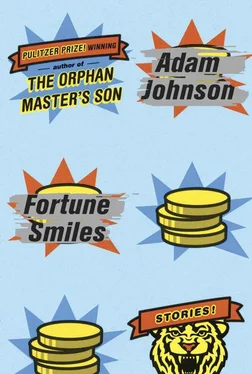I set off after Prinz, crunching through the leaves, and I can tell what you’re thinking: Hans, what are you doing reading a liberal rag like Der Spiegel? All I can say is that Gitte used to subscribe. She and I were storytellers. Swapping stories constituted our good times. That’s what sustained our marriage until, I guess, stories weren’t enough. While we cooked or gardened, I would tell stories from my day at the prison. They were glorious stories, worthy of retelling long after the prison was closed. Sometimes they were romantic, about young lovers who made terrible promises to each other before their interrogations. Often they were funny, like the color-blind prisoner who was always in a panic because he couldn’t tell whether the security lights were flashing red or green. I withheld only the tragic stories from Gitte, because she’d had enough of tragedy already.
To my stories, she would always say, “Oh, Hans, that’s awful. Where is your humanity?”
But she’d say it in that imploring way I took to mean, Tell me more .
Gitte tended not to leave the house. She was convinced — wrongly — that people looked at her a certain way because she was married to the warden of a Stasi prison. So she started a little business repairing cameras, Prakticas and Exaktas, mostly. All the East German models. She would read in the morning, and in the empty afternoon hours, with her fine tools and the bright light of a swing-arm magnifying lens, she would open up the camera bodies and tell her stories, which came from the pages of Der Spiegel . In her robe, she’d sip gimlets and relate all the anti-government articles she’d read about: surveillance programs, Bundeswehr in Afghanistan, Abu Ghraib, drones. As she spoke, she would smoke and gesture and drink until she couldn’t make the tiny screws go in their tiny holes.
She had a big heart for the underdog and was not the type to give any thought to the difficult, thankless decisions authorities have to make in order to keep a society functioning properly. I had a duty to the larger picture. To her stories, I always pointed out the hard truths those leftie articles conveniently omitted.
At a certain point in the evening, when we had made it through another day, there’d be no more need for talk. I’d prepare her last drink of the night, a large icy vodka with a wedge of grapefruit. It would be just the two of us — gone would be her tales of American intervention, gone would be the ghosts of my aging former inmates. As she quietly drank, I’d watch her lips embrace the rim, her throat lifting as she swallowed.
When only ice remained, I’d take her upstairs and help her to bed, where she would recline in total peace, and there would be no strife in the world — gone would be her regret at having married the warden of a Stasi prison, gone would be the guilt she carried over her past affairs. Even the war would recede, and all she’d endured as a girl in its aftermath.
“The embers,” she’d say at the edge of sleep. “Cup the embers.”
Her eyes would grow heavy, her lips mumbling words that belonged to the first flashes of a dream, and I’d ask her, “What are these embers you always speak of, where do you find them, can you feel their warmth?” But the liquor would have transported her already. I’d stroke her hair and run my hand along her shoulder. I believed she could perceive these gestures, that they reached the faraway place where the embers still glowed, even if her words and sentiments couldn’t bridge the passage back. That’s why, when her faint snoring came, I’d open her robe and slowly, tenderly begin making love to her.
Prinz sniffs something on the lawn. Looking closer, I see it is a small package wrapped in brown paper and twine. I halt. Narrowing my eyes, I pan the neighborhood, sweeping for a trace of the culprit who leaves them for me. This is the third package. I look up to the guard towers of Hohenschönhausen Prison. If only the prison were still open, if only I could check the surveillance footage from the perimeter wall, I might be able to identify the subversive who leaves me these gifts. But the cameras are gone, the facility long shut down.
The package I will deal with later.
With my boot, I scrape up a pile of leaves until it can no longer be seen.
Prinz and I walk down Lössauerstrasse. St. Martin’s lanterns hang from people’s balconies. Pumpkins line winterized walkways. All these homes were built for prison staff, including my own. While most of the guards have moved, some remain, and there’s a nice mix of old families and new. There were rumors after Reunification, after East Germany was no more, that we should give up our housing, that we were the evil apparatus of a country on the wrong side of history and didn’t deserve nice apartments in Berlin.
That was the rumor. No person ever said such a thing to my face.
Prinz and I turn the corner onto Genslerstrasse and stroll along the prison’s outer wall. Above are barbed wire and the ceramic insulators where electric wires once hung. Neighbors used to throw books over the wall at night, perhaps hoping that inmates would find them. It shows you how little people around here understood the nature of the facility. These books, together with objects that were confiscated from incoming inmates, constituted our “lost and found” box, which I regularly brought home to Gitte. In this way, in even the most repressive days of the GDR, she read 1984 and listened to cassettes of the Rolling Stones.
She once danced to this music and then, in a jaded, smoky voice, said, “Mick Jagger understands me. He gets who I am.”
I laughed. “Yes, you and the singer are practically friends.”
“Jagger and I have history,” she said. “We’ve shed the same tear.” She smiled and tossed her head — the signal for me to fix her next drink. “But you’re wrong,” she added. “It’s Orwell. He’s the one I’m friends with.”
Ahead, school buses are already lining up, their doors swinging open to release throngs of bored teenagers. You see, my prison, which was once the terror of every agitator and seditious traitor in the GDR, is now a memorial to which every angsty teen in Germany must be dragged once in his high school career. Here, they are taught about tyranny, totalitarianism and the terror of the Stasi’s central torture prison. The tour guides forget to mention the fact that not a single inmate was ever abused here, let alone tortured. That is because, and here I am not joking despite the grand absurdity of it: the tours are led by the criminals who used to be prisoners here.
Prinz hops into a little planter by the prison’s main entrance. He begins to circle, left then right, which means a crap is imminent. He is cute even when he shits — after his circle dance, he squats, rolls back his marble-black eyes and shivers up and down. Even the tree wells are part of the propaganda: each one is dedicated to the memory of a former inmate. Any weepy grandkid in Germany can, for ten thousand euros, buy one of these markers that will instantly turn a subversive grandfather into a martyred saint.
The plaque that Prinz squats over is for Klaus Wexler.
A group of idle teens ambles by, and whom should I see directing them but the curator himself. He is youngish and handsome, a tall intellectual from the university who will soon be bald before his time. Though he and I catch sight of each other many mornings, we have never spoken. The curator sees me, does a double take and calls his group to a halt.
He addresses the students: “And here is a commemoration to the playwright Klaus Wexler, who was imprisoned here for two years. After his release, he was a broken man and never wrote again.”
The teens stare at Prinz as he strains his bowels. Then they look to me, wondering whether this man in the leather overcoat will clean up his dog’s waste. But they do not know Hans, a man who believes in order and stability, who knows firsthand that without rules, everything descends into chaos.
Читать дальше












